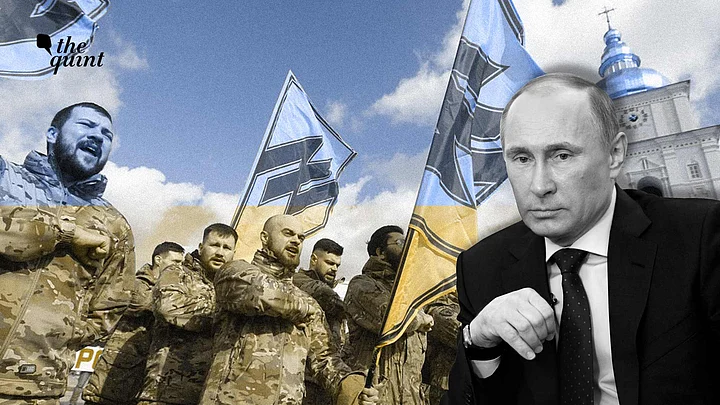Two direct quotes from Vladimir Putin's speech announcing the 'special military operation' in Ukraine have come under intense scrutiny.
Focused on their own goals, the leading NATO countries are supporting the far-right nationalists and neo-Nazis in Ukraine, those who will never forgive the people of Crimea and Sevastopol for freely making a choice to reunite with Russia.
We will seek to demilitarise and denazify Ukraine, as well as bring to trial those who perpetrated numerous bloody crimes against civilians, including against citizens of the Russian Federation.
In response to Putin's statements, the United States Holocaust Memorial Museum accused Putin of misappropriating Holocaust history.
"The Museum stands with the Ukrainian people, including the thousands of Holocaust survivors still living in the country," Museum chairperson, Ambassador Stuart E Eizenstat stated.
Ridiculous as it sounds to "denazify" a country with a Jewish president, Putin's claims are worthy of being looked into, regardless of how far-fetched they are.
So, what on earth is Putin talking about?
'Denazification'
The narrative that Ukraine has had Nazi elements since the end of the Second World War is deeply ingrained in Russian nationalist thought.
Some Ukrainian nationalists, during the Second World War, had collaborated with the Nazis and aided the genocide of Jewish people.
Seva Gunitsky, a political scientist at the University of Toronto who is an expert on Russia, tells Vox that, "It goes back to World War II, [when some] Ukrainian partisans took the Nazi side against the Soviets. The [new official] narrative in Russia [today] is that these are all neo-Nazis running the show."
Even the term "denazification" is borrowed from history.
It was used by the Allied Powers to root out the Nazi culture from German and Austrian societies, following the defeat of Nazi Germany in the Second World War.
For instance, in the Soviet-occupied zone of post-war Germany, Nazi members were routinely arrested and rendered impotent from participating in society.
Putin, in 2022, despite reviving the idea of 'denazification,' doesn't have much evidence to substantiate his claims that Ukraine is a Nazi state.
After all, President Volodymyr Zelenskyy is Jewish and three of his great uncles were murdered during the Holocaust.
Moreover, Zelenskyy, a Russian-speaking Jew, defeated a non-Jewish candidate by a huge margin in the last presidential elections.
Neo-Nazism in Ukraine
This is not to say that there are no far-right groups in Ukraine.
The most infamous one is the Azov Battalion, a nationalist para-militia, which is a neo-Nazi unit of the Ukrainian National Guard.
Azov fighters are mostly based in Eastern Ukraine, in Mauriopol (Donetsk Oblast), and its first proper battle was fought against pro-Russian separatists during the recapture of Mauriopol in 2014 after Russia annexed Crimea.
Their uniforms boast of Nazi symbols, and multiple interviews with Azov members have cleared the air about their Nazi sympathies and their anti-Semitism.
Additionally, some of the far-right white supremacist political parties in the country are the Congress of Ukrainian Nationalists, Right Sector, and Svoboda.
The question is, how much of a threat do all these organisations pose to the functioning and existence of the state of Ukraine?
Is there a serious enough threat for Putin to justify his invasion, in the name of 'denazification?'
The only political party to have a place in the current Ukrainian parliament is Svoboda, and it won literally one seat.
Andreas Umland, who works for the Stockholm Center for Eastern European Studies, told Deutsche Welle that far-right groups in Ukraine are inconsequential in politics and barely play a role in elections.
"We had a united front of all radical right-wing parties in the last parliamentary elections in 2019 where they won 2.15% of the vote," he added.
Talking about the neo-Nazi Azov Battalion, it became formally incorporated into Ukrainian National Guard in late 2014 after it emerged to be an important fighting unit against pro-Russian separatists.
Nazism is evil, but Azov's neo-Nazism seems to be more of a problem to Russia at the moment, and not to Ukraine.
These fighters, anticipating a Russian invasion, had been training Ukrainians in Mauriopol to defend the country.
One such instance went viral on social media – the 79-year-old grandmother seen learning how to shoot.
The point is that the neo-Nazis that Putin claims to be saving Ukraine from, are actually fighting against Putin in this war.
Nevertheless, Ukraine's neo-Nazis have provided a ton of propaganda material to Putin in order to achieve his actual goal - the overthrow of the government in Kyiv.
Putin Pronounced 'Decapitation' Wrong
Even though he claims that he wants to cleanse Ukraine of Nazis, Putin's actions have been reminiscent of Nazi Germany during the Second World War.
"Brazenly invading another country, invoking fake grievances, lying incessantly and denying another nation's right to chart its own destiny are all, yes, taken from the Nazi playbook," says David Harris, CEO of the American Jewish Committee, as quoted by NBC News.
Putin wrongly pronounced 'decapitation' as 'denazification.'
He wants to take Ukraine back to the days of the Viktor Yanukovych government, which ruled the country from 2010 to 2014, and had essentially made the country a satellite state of Russia.
That new regime would ensure that Kyiv pivots towards Moscow, and not NATO and Western Europe.
It would also be a government under Vladimir Putin's thumb, and therefore, hardly a democracy.
The Russian president wants a president in Ukraine whose every move is controlled by the Kremlin.
He, however, can't say that out loud because of the well-established international order and democratic norms that exist in the world today.
That is why he needed a new catchphrase.
